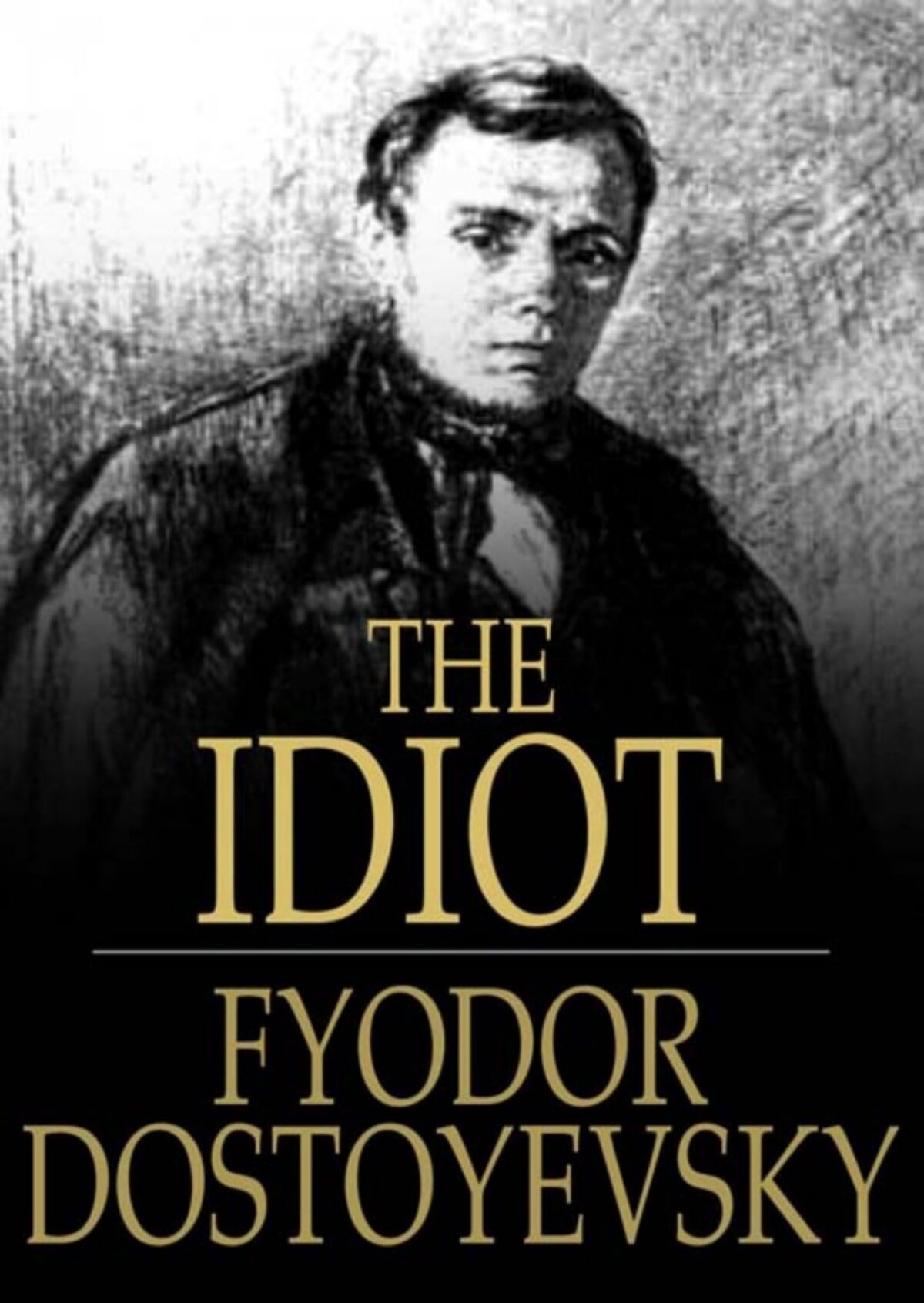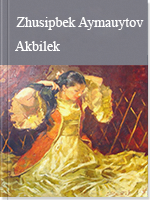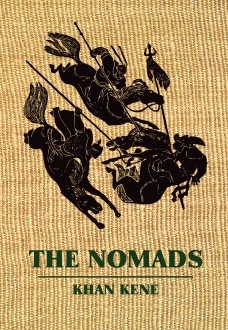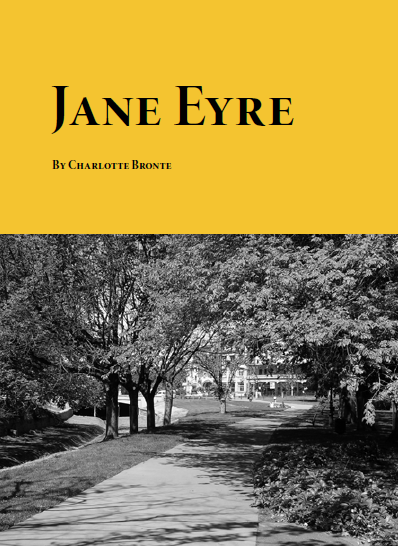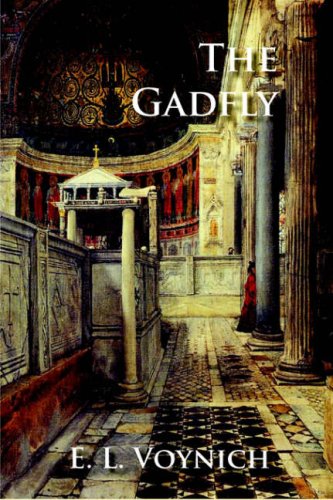The Idiot
Characters
- Lev Nikoláyevich Mýshkin (Лев Никола́евич Мы́шкин)
- Nastásya Philíppovna Baráshkova (Наста́сья Фили́пповна Бара́шкова)
- Parfyón Semyónovich Rogózhin (Парфён Семёнович Рого́жин)
- General Iván Fyódorovich Yepanchín
- Elizavéta (Lizavéta) Prokófyevna
- Alexándra Ivánovna
- Adelaída Ivánovna
- Agláya Ivánovna
- General Ardalión Alexándrovich Ivolgin
- Nína Alexándrovna
- Gavríla Ardaliónovich (Gánya, Gánechka, Gánka)
- Varvára Ardaliónovna
- Lukyán Timoféevich Lébedev
- Véra Lukyánovna
- Ippolít Teréntyev
- Iván Petróvich Ptítisyn
- Evgény Pávlovich Radómsky
- Prince Shch.
- Afanásy Ivánovich Tótsky
- Ferdýshchenko
- Lieutenant, ret. Keller
- Antíp Burdóvsky
Part 1
Prince Lev Nikolayevich Myshkin, a fair-haired young man in his mid-twenties and a descendant of one of the oldest Russian lines of nobility, is on a train to Saint Petersburg on a very cold November morning. He is returning to Russia having spent the past four years in a Swiss clinic for treatment of a severe epileptic condition. On the journey Myshkin meets a young man of the merchant class, Parfyon Semyonovich Rogozhin, and is struck by his passionate intensity, particularly in relation to a woman—the dazzling society beauty Nastassya Filippovna—with whom he is obsessed. Rogozhin has just inherited a very large fortune from his dead father and he intends to use it to pursue the object of his desire. Joining in their conversation is a somewhat disreputable civil servant named Lebedyev - an "omniscient" gentleman with a profound knowledge of social trivia and gossip. Realizing who Rogozhin is, he firmly attaches himself to him.
The purpose for Myshkin's trip is to make the acquaintance of his very distant relative Lizaveta Prokofyevna Yepanchina, and to make inquiries about a certain matter of business. Madame Yepanchina is the wife of General Yepanchin, a wealthy and respected man in his mid fifties. When the Prince calls on them he is instructed to wait by a servant. He strikes up a conversation with the servant, treating him as an equal and expatiating, to the lackey's surprise, on the subject of the horror of capital punishment. General Yepanchin has an ambitious and vain assistant, Gavril Ardalionovich Ivolgin (Ganya), who the Prince also meets while waiting. The General and his business partner, the aristocrat Totsky, are seeking to arrange a marriage between Ganya and Nastassya Filippovna. Though herself of noble descent, Nastassya Filippovna became a ward of Totsky at the age of 7, following a family tragedy. When she was 16, Totsky had settled her in a very comfortable little house in the country, provided her with tutors, a library and other cultural refinements, and for the next four years treated her as his concubine. Now a grown woman, she has made it frighteningly clear to him that she does not intend to let him off lightly. Totsky, thinking the marriage might settle her and free him to pursue his desire for marriage with General Yepanchin's eldest daughter, has promised 75,000 rubles. Nastassya Filippovna, unsure of Ganya's motives and aware that his family does not approve of her, has reserved her decision, but has promised to announce it that evening at her birthday soirée. Ganya and the General openly discuss the subject in front of Myshkin. Ganya shows him a photograph of her and he is particularly struck by her face. The Prince tells them of Rogozhin's interest in Nastassya Filippovna, and Ganya asks the Prince whether Rogozhin would marry her. The Prince replies that he might well marry her and then murder her a week later.
Myshkin makes the acquaintance of Lizaveta Prokovyevna and her three daughters—Alexandra, Adelaida and Aglaya, the last being the youngest and the most beautiful. They are all very curious about him and not shy about expressing their opinion, particularly Aglaya. He readily engages with them and speaks with remarkable candour on a wide variety of subjects - his illness, his impressions of Switzerland, art, philosophy, love, death, the brevity of life, capital punishment, and donkeys. In response to their request that he speak of the time he was in love, he tells a long anecdote from his time in Switzerland about a downtrodden woman—Marie—whom he befriended, along with a group of children, when she was unjustly subjected to cruel persecution and universal moral condemnation. The Prince ends by describing what he divines about each of their characters from studying their faces, and surprises them by saying that Aglaya is almost as beautiful as Nastassya Filippovna.
The prince rents a room in the Ivolgin apartment, occupied by Ganya; Ganya's sister Varvara Ardalyonovna (Varya); his mother, Nina Alexandrovna; his teenage brother, Nikolai (Kolya); his father, General Ivolgin; and another lodger named Ferdyshchenko. There is much angst within Ganya's family about the proposed marriage, which is regarded, particularly by his mother and sister, as shameful. Just as a quarrel on the subject is reaching a peak of tension, Nastassya Filippovna herself arrives to pay a visit to her potential new family. Shocked and embarrassed, Ganya succeeds in introducing her, but when she bursts into a prolonged fit of laughter at the look on his face, his expression transforms in to one of murderous hatred. The Prince, fearing something might happen, intervenes to calm him down, and Ganya's rage is diverted toward him in a violent gesture. Ganya recovers himself, but his extreme discomfort is not helped by the entrance of his father—a drunkard with a tendency to tell elaborate lies. Nastassya Filippovna flirtatiously encourages the General, and then mocks him. Ganya's humiliation is compounded by the arrival of Rogozhin, accompanied by a rowdy crowd of drunks and rogues, Lebedyev among them. Rogozhin openly starts bidding for Nastassya Filippovna, ending with an offer of a hundred thousand rubles. With the scene assuming increasingly scandalous proportions, Varya angrily demands that someone remove the "shameless woman". Ganya loses all control and violently seizes his sister's arm. Cheered on by Nastassya Filippovna, Varya spits in his face. He is about to strike her when the Prince again intervenes, and Ganya slaps him in the face with all his might. Everyone is deeply shocked, including Nastassya Filippovna, and she struggles to maintain her mocking aloofness as the others seek to comfort the Prince. Myshkin admonishes her, and tells her it is not who she really is. She apologises to Ganya's mother and leaves, telling Ganya to be sure to come to her birthday party that evening. Rogozhin and his retinue go off to raise the 100,000 rubles.
Among the guests at the party are Totsky, General Yepanchin, Ganya, his friend Ptitsyn (Varya's husband), and Ferdyshchenko, who, with Nastassya Filippovna's approval, plays the role of cynical buffoon. With the acquiescence of Kolya, Prince Myshkin arrives, uninvited. To enliven the party, Ferdyshchenko suggests a game where everyone must recount the story of the worst thing they have ever done. Others are shocked at the proposal, but Nastassya Filippovna is enthusiastic. When it comes to Totsky's turn he tells a long but completely innocuous anecdote from the distant past. Disgusted and angry, Nastassya Filippovna turns to Myshkin and demands his advice on whether or not to marry Ganya. Myshkin advises her not to, and Nastassya Filippovna, to the dismay of Totsky, General Yepanchin and Ganya, firmly announces that she is following this advice. At this point, Rogozhin and his followers arrive with the promised 100,000 rubles. Nastassya Filippovna is preparing to leave with him, exploiting the scandalous scene to humiliate Totsky, when Myshkin himself offers to marry her. He speaks gently and sincerely, and in response to incredulous queries about what they will live on, produces a document indicating that he will soon be receiving a large inheritance. Though surprised and deeply touched, Nastassya Filippovna, after throwing the 100,000 rubles in the fire and telling Ganya they are his if he wants to get them out, chooses to leave with Rogozhin. Myshkin follows them.
Part 2
For the next six months Nastassya Filippovna is torn between Myshkin's compassionate and insightful love for her and a self-punishing desire to ruin herself by submitting to Rogozhin's passion. Myshkin is tormented by her suffering, and Rogozhin is tormented by her love for Myshkin and her frequently expressed disdain for his own claims on her. After much travelling, Myshkin returns to St. Petersburg and visits Rogozhin's house. They discuss religion and exchange crosses, but Nastassya Filippovna remains between them. Myshkin becomes increasingly horrified at Rogozhin's attitude to her. Rogozhin confesses to beating her in a jealous rage, and raises the possibility of cutting her throat. However, they part as friends, with Rogozhin even making a gesture of concession. The Prince remains troubled and for the next few hours he wanders the streets, immersed in intense contemplation. At a certain point he begins to suspect that Rogozhin is watching him. He returns to his hotel where Rogozhin—who has been hiding in the stairway—attacks him with a knife. But at the same moment the Prince is struck down by a violent epileptic seizure, and Rogozhin flees in a panic.
Recovering from the fit, Myshkin joins Lebedyev (from whom he is renting a dacha) in the Summer resort town Pavlovsk. He knows that Nastassya Filippovna is in Pavlovsk, and that Lebedyev is aware of her movements and plans. Also in Pavlovsk are the Epanchins and they come to visit the Prince. They are joined by the Epanchins' friend Yevgeny Pavlovich Radomsky, a handsome and wealthy military officer with a particular interest in Aglaya. Aglaya, however, is more interested in the Prince, and to Myshkin's embarrassment and everyone else's amusement, she recites Pushkin's poem "The Poor Knight" in an obvious but unspoken reference to his noble efforts to save Nastassya Filippovna.
The Epanchins' visit is rudely interrupted by the arrival of Burdovsky, a young man who claims to be the illegitimate son of Myshkin's late benefactor, Pavlishchev. The inarticulate Burdovsky is supported by a group of insolent young men. These include: the consumptive seventeen-year-old Ippolit Terentyev—a friend of Kolya's—who surprises everyone with his shrill, hysterical voice; the nihilist Doctorenko, who is Lebedyev's nephew; and Keller, an ex-officer who, with the help of Lebedyev, has written an article vilifying the Prince and Pavlishchev. They demand money from Myshkin as a "just" reimbursement for Pavlishchev's support, but their arrogant bravado is severely dented when Gavril Ardalionovich, who has been researching the matter on Myshkin's behalf, proves conclusively that the claim is false and that Burdovsky has been deceived. The Prince tries to reconcile with the young men and offers financial support anyway. Disgusted by the young men and the Prince's conciliatory attitude, Lizaveta Prokofyevna loses all control and furiously attacks both parties. This causes Ippolit to laugh and Lizaveta Prokofyevna seizes him by the arm. Ippolit breaks into a prolonged fit of coughing, but he suddenly becomes calm, informs them all that he is near death, and politely requests that he be permitted to talk to them for a while. He awkwardly attempts to express his need for their love, eventually bringing both himself and Lizaveta Prokofyevna to the point of tears. But as the Prince and Lizaveta Prokofyevna discuss what to do with the invalid, another transformation occurs and Ippolit, after unleashing a torrent of abuse at the Prince, leaves with the other young men. The Epanchins also leave, both Lizaveta Prokofyevna and Aglaya deeply indignant with the Prince. Only Yevgeny Pavlovich remains in good spirits, and he smiles charmingly as he says good-bye. At that moment, a magnificent carriage suddenly pulls up at the dacha, and the ringing voice of Nastassya Filippovna calls out to Yevgeny Pavlovich. In a laughing, familiar tone she tells him not to worry about all the IOUs as Rogozhin has bought them up. The carriage departs, leaving everyone, particularly Yevgeny Pavlovich and the Prince, in a state of shock. Yevgeny Pavlovich claims to know nothing about the debts, and Nastassya Filippovna's motives become a subject of anxious speculation.
Part 3
Reconciling with Lizaveta Prokofyevna, the Prince visits the Epanchins at their dacha. He is beginning to fall in love with Aglaya, and she likewise appears to be fascinated by him, though she often mocks or angrily reproaches him for his naiveté and excessive humility. Myshkin joins Lizaveta Prokofyevna, her daughters and Yevgeny Pavlovich for a walk to the park to hear the music. While listening to the high-spirited conversation and watching Aglaya in a kind of daze, he notices Rogozhin and Nastassya Filippovna in the crowd. Nastassya Filippovna again addresses herself to Yevgeny Pavlovich, as if surprised to see him there, and in the same jolly tone as before loudly informs him that his uncle—a wealthy and respected old man from whom he is expecting a large inheritance—has shot himself and that a huge sum of government money is missing. Yevgeny Pavlovich stares at her in shock as Lizaveta Prokofyevna makes a hurried exit with her daughters. Nastassya Filippovna hears an officer friend of Yevgeny Pavlovich suggest that a whip is needed for women like her, and she responds by grabbing a riding-whip from a bystander and striking the officer across the face with it. He tries to attack her but Myshkin restrains him, for which he is violently pushed. Rogozhin, after making a mocking comment to the officer, leads Nastassya Filippovna away. The officer recovers his composure, addresses himself to Myshkin, politely confirms his name, and leaves.
Myshkin follows the Epanchins back to their dacha, where eventually Aglaya finds him alone on the verandah. To his surprise, she begins to talk to him very earnestly about duels and how to load a pistol. They are interrupted by General Epanchin who wants Myshkin to walk with him. Aglaya slips a note into Myshkin's hand as they leave. The General is greatly agitated by the effect Nastassya Filippovna's behaviour is having on his family, particularly since her information about Yevgeny Pavlovich's uncle has turned out to be completely correct. When the General leaves, Myshkin reads Aglaya's note, which is an urgent request to meet her secretly the following morning. His reflections are interrupted by Keller who has come to offer to be his second at the duel that will inevitably follow from the incident that morning, but Myshkin merely laughs heartily and invites Keller to visit him to drink champagne. Keller departs and Rogozhin appears. He informs the Prince that Nastassya Filippovna wants to see him, and that she has been in correspondence with Aglaya. She is convinced that the Prince is in love with Aglaya and is desperately seeking to bring them together. Myshkin is perturbed by the information, but he remains in an inexplicably happy frame of mind and speaks with forgiveness and brotherly affection to Rogozhin. Remembering it will be his birthday tomorrow, he persuades Rogozhin to join him for some wine.
They find that a large party has assembled at his home and that the champagne is already flowing. Present are Lebedyev, his daughter Vera, Ippolit, Burdovsky, Kolya, General Ivolgin, Ganya, Ptitsyn, Ferdyschenko, Keller, and, to Myshkin's surprise, Yevgeny Pavlovich, who has come to ask for his friendship and advice. The guests greet the Prince warmly and compete for his attention. Stimulated by Lebedyev's eloquence, everyone engages for some time in intelligent and inebriated disputation on lofty subjects, but the good-humoured atmosphere begins to dissipate when Ippolit suddenly produces a large red-sealed envelope and announces that it contains an essay he has written which he now intends to read to them. The essay is a series of verbose psychological observations on the subject of his own approaching death, written in a defiant, self-conscious style, and culminating in the announcement that, rather than go on living for a few more weeks, he will be shooting himself at sunrise. The reading drags on for over an hour and by its end the sun has risen. Most of his audience, however, are bored and resentful, apparently not at all concerned that he is about to shoot himself. Only Vera, Kolya, Burdovsky and Keller seek to restrain him. He distracts them by pretending to abandon the plan, then suddenly pulls out a small pistol, puts it to his temple and pulls the trigger. There is a click but no shot: Ippolit faints but is not killed. It turns out, to the great amusement of some, that he had taken out the cap earlier and forgotten to put it back in. Ippolit is devastated and tries desperately to convince everyone that it was an accident. Eventually he falls asleep and the party disperses.
The Prince wanders for some time in the park before falling asleep at the green seat appointed by Aglaya as their meeting place. Her laughter wakes him from an unhappy dream about Nastassya Filippovna, and they talk for a long time about the letters Aglaya has received. In the letters, Nastassya Filippovna writes that she herself is in love with Aglaya and passionately beseeches her to marry Myshkin, but Aglaya interprets this as evidence that Nastassya Filippovna is in love with him herself, and demands that Myshkin explain his feelings toward her. Myshkin replies that Nastassya Filippovna is insane, that he only feels profound compassion and is not in love with her, but admits that he has come to Pavlovsk for her sake. Aglaya becomes angry, demands that he throw the letters back in her face, and storms off. Myshkin reads the letters with dread, and later that day Nastassya Filippovna herself appears to him, asking desperately if he is happy, and telling him she is going away and will not write any more letters. Rogozhin escorts her.
Part 4
It is clear to Lizaveta Prokofyevna and General Epanchin that their daughter is in love with the Prince, but Aglaya denies this and angrily dismisses talk of marriage. She continues to mock and reproach him, often in front of others, and lets slip that, as far as she is concerned, the problem of Nastassya Filippovna is yet to be resolved. Myshkin himself merely experiences an uncomplicated joy in her presence, and is mortified when she appears to be angry with him. Lizaveta Prokofyevna feels it is time to introduce the Prince to their aristocratic circle and a dinner party is arranged for this purpose, to be attended by a number of eminent and influential persons. Aglaya, who does not share her parents' respect for these people and is afraid that Myshkin's eccentricity will not meet with their approval, tries to tell him how to behave, but ends by sarcastically telling him to be as eccentric as he likes, and to be sure to wave his arms about when he is pontificating on some high-minded subject and break her mother's priceless Chinese vase. Feeling her anxiety, Myshkin too becomes extremely anxious, but he tells her that it is nothing compared to the joy he feels in her company. He tries to approach the subject of Nastasya Filippovna again, but she silences him and hurriedly leaves.
For a while the dinner party proceeds smoothly. Inexperienced in the ways of the aristocracy, Myshkin is deeply impressed by the elegance and good humour of the company, unsuspicious of its superficiality. It turns out that one of those present—Ivan Petrovich—is a relative of his beloved benefactor Pavlishchev, and the Prince becomes extraordinarily enthusiastic. But when Ivan Petrovich mentions that Pavlishchev ended by giving up everything and going over to the Roman Church, Myshkin is horrified. He launches unexpectedly into a tirade against Catholicism, claiming that it preaches the Antichrist and in its quest for political supremacy has given birth to Atheism. Everyone present is shocked and several attempts are made to stop or divert him, but he only becomes more animated. At the height of his fervor he begins waving his arms about and knocks over the priceless Chinese vase, smashing it to pieces. There is a lull as Myshkin emerges from his profound astonishment and the general horror turns to amusement and concern for his health; but it is only temporary, and he soon begins another spontaneous discourse, this time on the subject of the aristocracy in Russia, once again becoming oblivious to all attempts to quell his ardour. The speech is only brought to an end by the onset of an epileptic seizure: Aglaia, deeply distressed, catches him in her arms as he falls. He is taken home, having left a decidedly negative impression on the guests.
The next day Lizaveta Prokofyevna and her daughters visit Myshkin to check on his health and assure him of their friendship. They are followed by Ippolit, who informs the Prince that he and others (such as Lebedyev and Ganya) have been intriguing against him, and have been unsettling Aglaya with talk of Nastassya Filippovna. Ippolit has arranged, at Aglaya'a request and with Rogozhin's help, a meeting between the two women. That evening Aglaya, having left her home in secret, calls for the Prince. They proceed in silence to the appointed meeting place, where Nastassya Filippovna waits for Aglaya to begin. It soon becomes apparent that Aglaya has not come there to discuss anything, but to chastise and humiliate Nastassya Filippovna. Nastassya Filippovna responds in kind and a bitter exchange of accusations and insults ensues. Nastassya Filippovna orders Rogozhin to leave and hysterically demands of Myshkin that he stay with her. Myshkin, once again torn by her suffering, is unable to deny her and reproaches Aglaya for her attack. Aglaya looks at him with pain and hatred, and runs off. He goes after her but Nastassya Filippovna stops him desperately and then faints. Myshkin stays with her.
In accordance with Nastassya Filippovna's wish, she and the Prince become engaged. Public opinion is highly critical of Myshkin's actions toward Aglaya, and the Epanchins break off all relations with him. He tries to explain to Yevgeny Pavlovich that Nastassya Filippovna is a broken soul, that he must stay with her or she will probably die, and that Aglaya will understand if he is only allowed to talk to her. Yevgeny Pavlovich refuses to facilitate any contact between them and suspects that Myshkin himself is mad.
On the day of the wedding a beautifully attired Nastassya Filippovna is met by Keller and Burdovsky, who are to escort her to the church where Myshkin is waiting. A large crowd has gathered, among whom is Rogozhin. Seeing him, Nastassya Filippovna rushes to him and tells him hysterically to take her away, which Rogozhin loses no time in doing. The Prince, though shaken, is not particularly surprised at this development. For the remainder of the day he calmly fulfills his social obligations to guests and members of the public. The following morning he takes the first train to Petersburg and goes to Rogozhin's house, but he is told by servants that there is no-one there. After several hours of fruitless searching, he returns to the hotel he was staying at when he last encountered Rogozhin in Petersburg. Rogozhin appears and asks him to come back to the house. They enter the house in secret and Rogozhin leads him to the dead body of Nastassya Filippovna: he has stabbed her through the heart. The two men keep vigil over the body, which Rogozhin has laid out in his study.
Rogozhin is sentenced to fifteen years hard labor in Siberia. Myshkin goes mad and, through the efforts of Yevgeny Pavlovich, returns to the sanatorium in Switzerland. The Epanchins go abroad and Aglaya, against the wishes of her family, marries a wealthy, exiled Polish count who later is discovered to be neither wealthy, nor a count, nor an exile—at least, not a political exile—and who, along with a Catholic priest, has turned her against her family.
Share:







